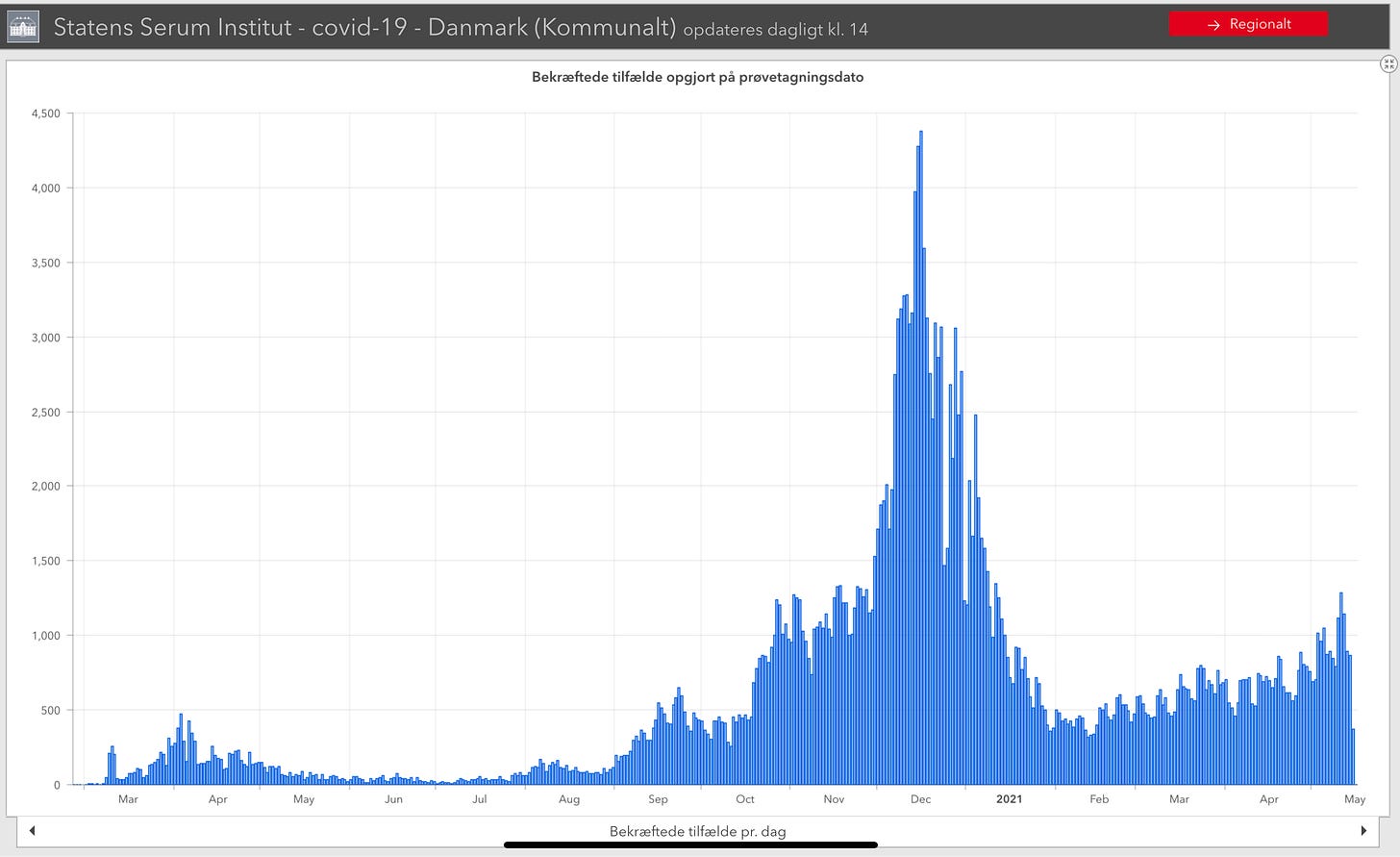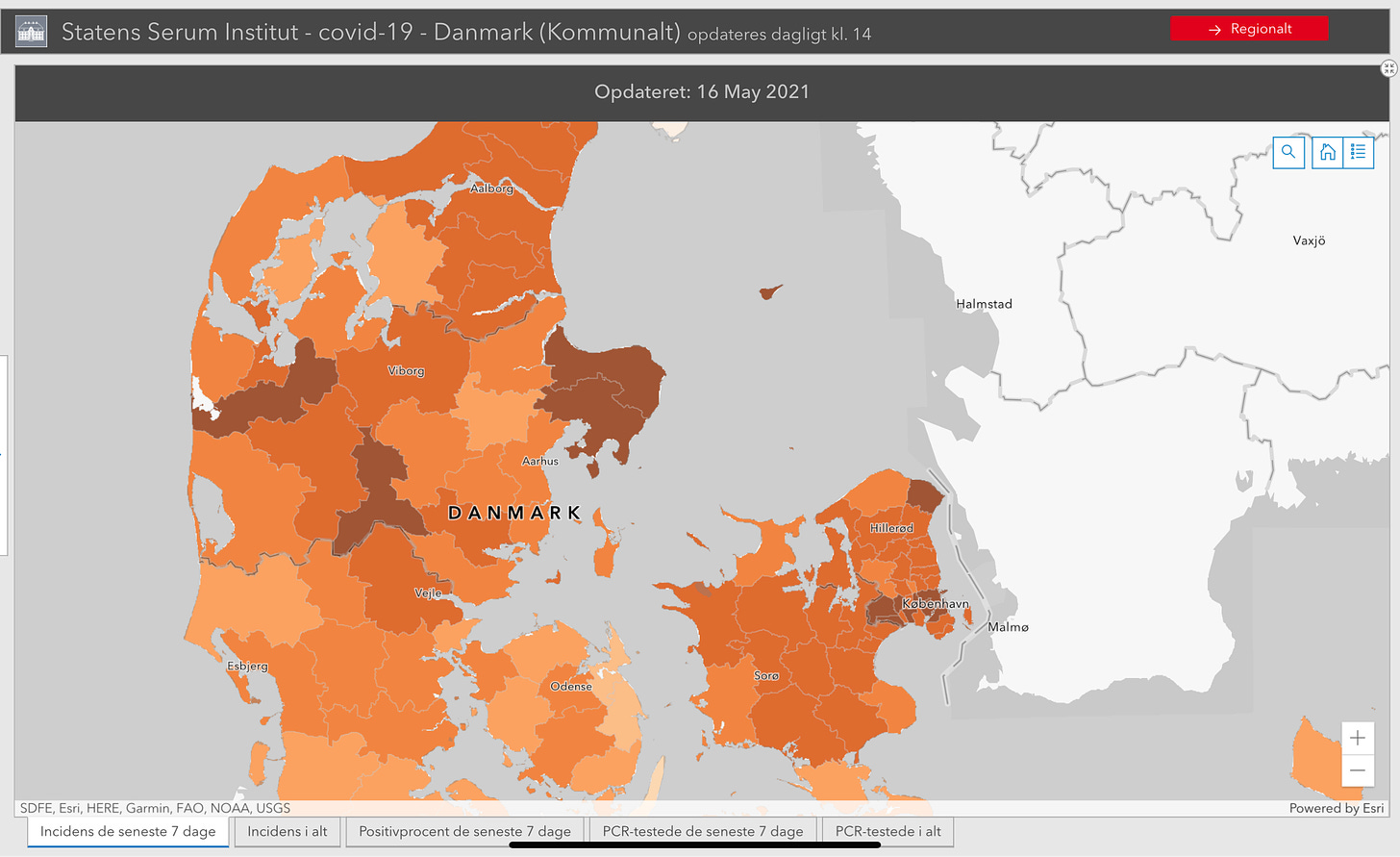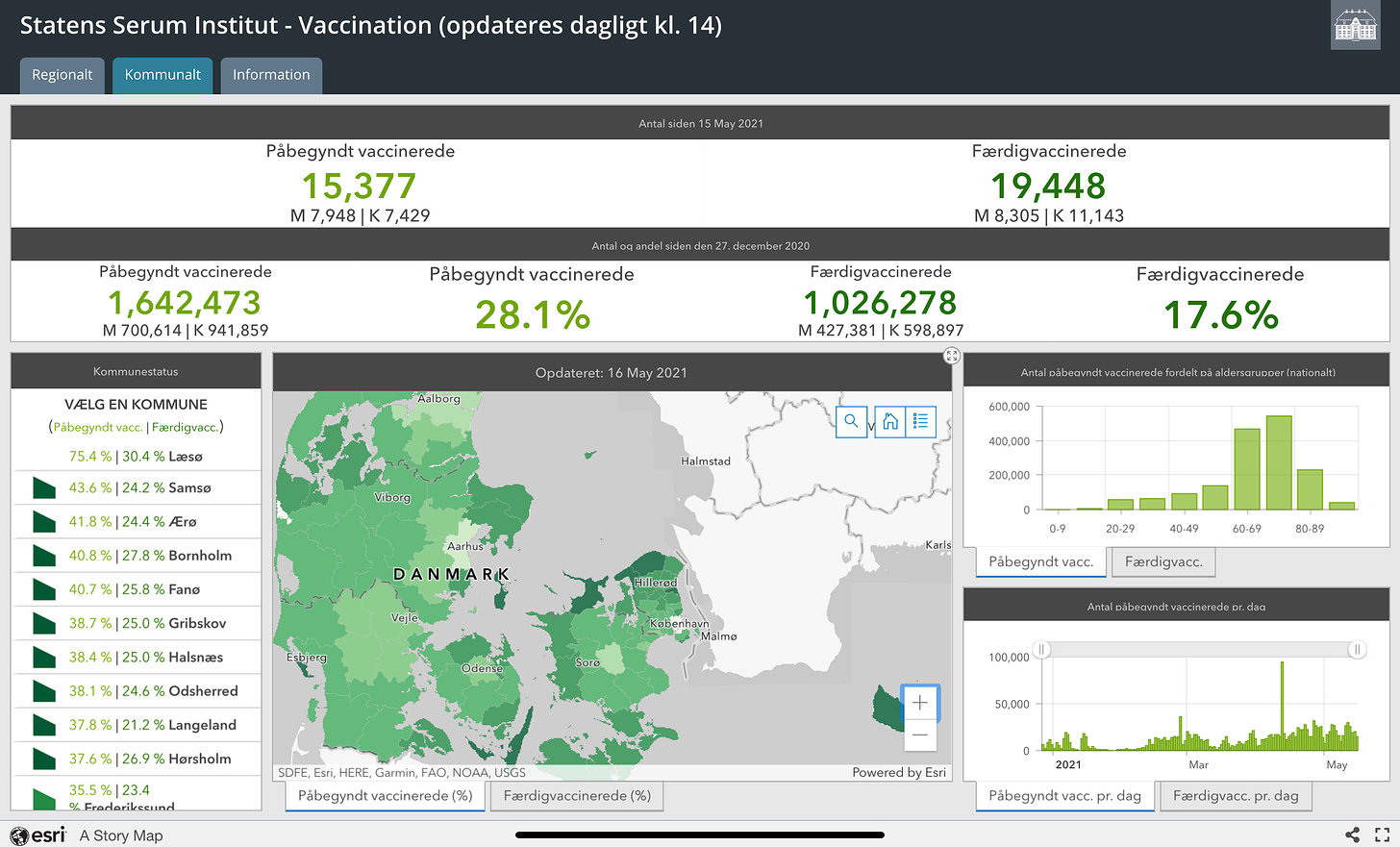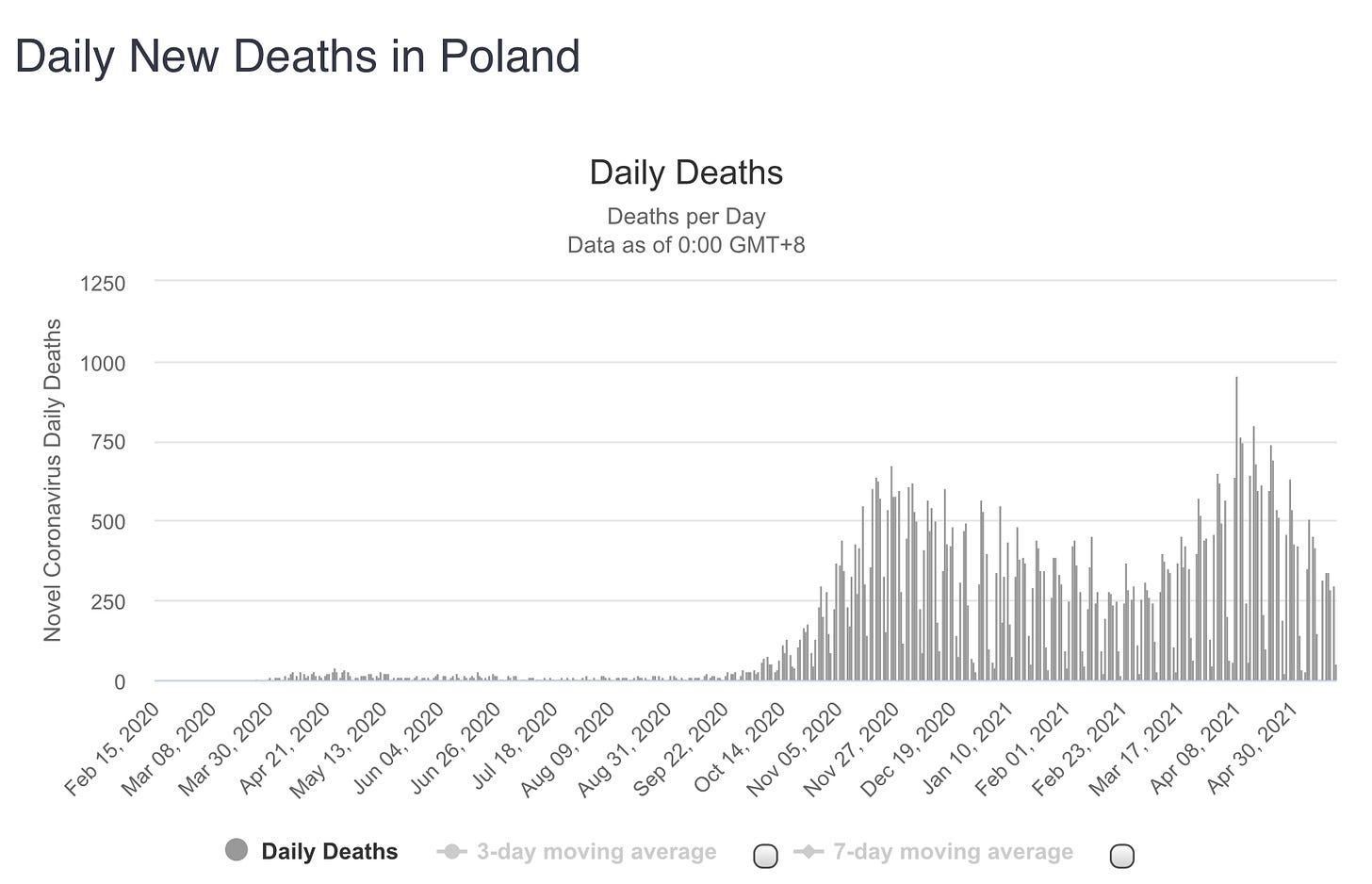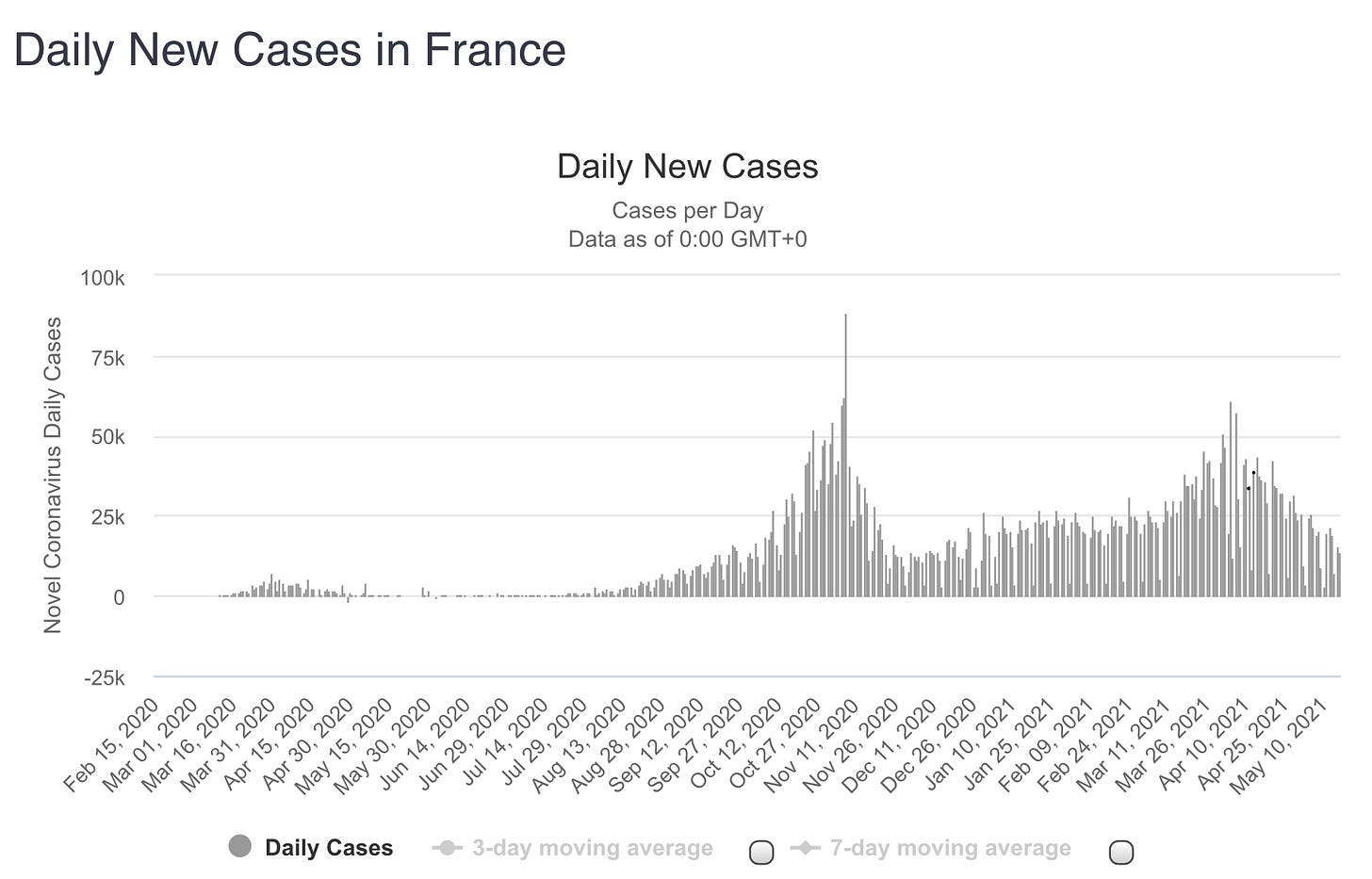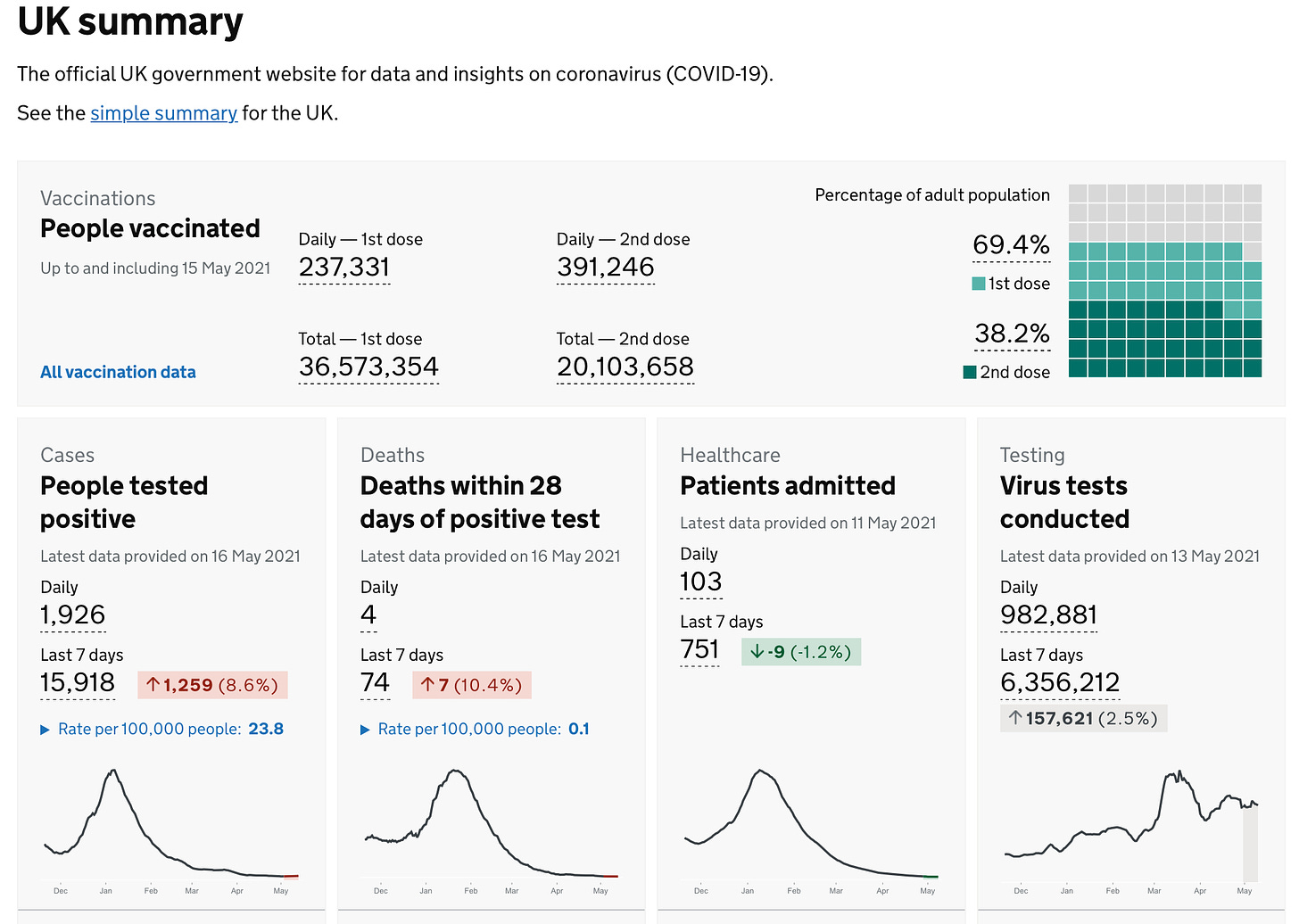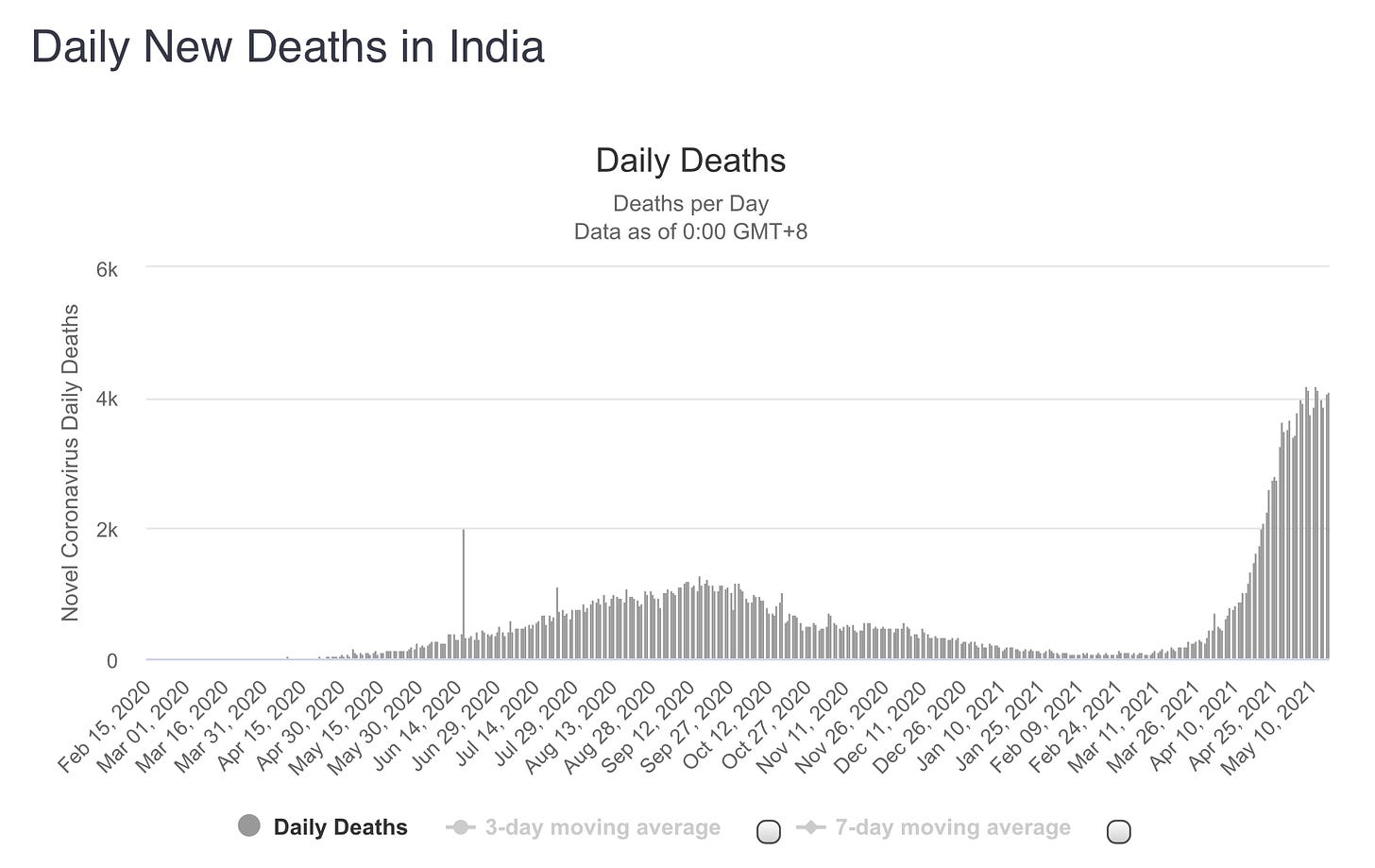Monday Morning News & Notes
Another phase of reopening looms as Danish politicians hammer out the details
🇩🇰
Danish politicians will begin another round of negotiations today ahead of the next phase of gradually easing COVID restrictions, which is scheduled for May 21st. They do so this time with the infection curve pushing steadily upward and no sign yet of a promised massive increase in daily vaccinations. One of the main planks of the reopening this time will be a plan to begin gradually moving people working from home back into the office or workplace.
TV2 is reporting the negotiations could result in a change to how the coronapas system works, moving it to what is called ‘the drivers license’ model. This would essentially take the onus off of the business, venue, or restaurant to check every coronapas at the door, becoming a person’s responsibility to show it when asked. This could happen in random checks by event security or during a police check of a restaurant and its customers, which has already been happening.
-
As of today, the Southern Denmark Health Region (Region Syddanmark) is expanding access to any left over vaccine doses at its 32 vaccination sites to anyone over the age of 50.
You have to sign up each day between 7:00 AM and noon to be on the residual vaccine list. You must also live close enough to a vaccination site that you can be there within 30 minutes of getting a call.
You can sign up to be on the residual vaccine list at the link on the page HERE.
Health region Executive Vice President Kurt Espersen:
“It is really gratifying that we can now offer residual vaccine lists at all the region's vaccine sites. The residual vaccine lists help to ensure that vaccines are not wasted. I would like to emphasize that, in general, we have become really good at adjusting the number of doses opened with the number of citizens present. Therefore, I also expect that there is a fairly low number of vaccines that can be offered every day. But we are grateful for the many citizens who sign up and stand ready if there are any vaccines left over when the day is done so we can use them all.”
The list is not prioritized by according to time of registration but rather whether someone has received a vaccination invitation, their age, and proximity to the vaccine site having any extra doses.
-
Denmark added 2,038 COVID infections and three more coronavirus deaths since Friday’s update. On Saturday it reported 1,074 new cases and three fatalities while on Sunday it registered another 964 infections.
The infection situation nationally in Denmark is stable, however, it is the opposite story in Copenhagen according to one professor. Hans Jørn Kolmos, Professor of Clinical Microbiology at the University of Southern Denmark, tells Ritzau that he is very concerned about the infection situation in Copenhagen.
“What worries me is the development in Copenhagen. There we have seen a steadily increasing trend over the last little while. In the last seven days, there have been 1,504 infections reported in Copenhagen. This means that the city has one of the country's highest incidence rates, that is, the number of infections per 100,000 citizens.”
According to the Staten Serum Institute as of yesterday’s update, Copenhagen Kommune has a coronavirus incidence rate of 239 per 100,000 residents. Seven of the twelve municipalities in Denmark with an incidence rate greater than 200 are all in Metro Copenhagen. They are Høje-Taastrup (268), Ishøj (262), Brøndby (234), Frederiksberg (232), Rødovre (226), Albertslund (213) and København itself.
The other five hardest hit kommunes in Denmark right now are Helsingør on Sjælland (209), Holstebro in Vestjylland (244), Ikast-Brande (215) in Midtjylland, Norddjurs (205), and Syddjurs (202) both in Østjylland.
-
On the vaccination campaign to date, 1,642,473 1st vaccination doses (28.1% of the population) have been administered while second doses have now broken the one-million mark with 1,026, 278 people (17.6%) now fully vaccinated.
Yesterday there were 34,825 total vaccinations done.
DR is reporting that a test excavation of hundreds of thousands of mink carcasses was carried out near Holstebro over the weekend. The mink were culled by government order due to fears of a mink COVID variant, an order later deemed to be illegal. In all, the national broadcaster says some 1,300 tonnes of dead mink were removed and incinerated. The mink were improperly buried in a site near a lake popular for summer swimming prompting both local outrage and environmental concerns.
🇳🇴
The Norwegian Institute of Public Health has released the findings of another population level survey. The survey aimed to find out whether there is enough information available on COVID vaccines for people to feel informed, and whether or not they plan to get inoculated.
The survey found nationally 87% of Norwegians want to get vaccinated. Of those 20% have already begun the vaccination process. The highest support for vaccinations was among those over the age of 60, with 97% planning on getting the jab.
However, the institute found concerns on the other end of the age spectrum. The survey found younger age groups felt less informed about the coronavirus vaccines.
Director Geir Bukholm:
“Although the attitude to taking the vaccines is very positive in all age groups, we see that in some of the younger age groups, more information is needed to be able to make an informed choice.”
He says the findings have prompted the institute to begin formulating vaccine information campaigns aimed directly at young people.
As for why they want to be vaccinated, there were two clear major motivations. 81% of respondents to the survey said they miss socializing, while 62% wanted to hit the airport and get traveling again.
🇪🇺🎤
Eurovision organizers reported on Saturday that a member of the Polish delegation has tested positive for COVID. The person in question had been in a Eurovision venue with the rest of the delegation with a negative test a few days prior. The person in question, as well as the rest of the Polish delegation, are now in quarantine.
“Our primary objective is to produce a fully COVID-19 safe event, and the health and welfare of all those taking part, working at the event or in the audience is our most important priority. A range of strict measures, including isolation, social distancing and regular testing have been imposed on everyone on the advice of health professionals to ensure everyone’s safety.”
This year’s Eurovision is taking place in Rotterdam in the Netherlands.
🇵🇱
Poland is relaxing some COVID restrictions as the country comes out of a lethal variant driven infection wave. Indoor dining will resume once again after being banned for six months. However, strict social distancing applies inside with customers only allowed at every second table.
The mask mandate is also being relaxed slightly with masks allowed to be removed while outdoors as long they are at least 1.5 meters from other people. Masks must still be worn on all public transit, in shops, and inside public buildings.
Poland suffered the highest number of daily coronavirus deaths of any E.U. country for a number of weeks during its last infection wave. To date, the country has lost a total of 71,664 lives in the pandemic.
🇫🇷
Over the weekend France reached its target of getting 20-million COVID vaccinations done by mid-May. French president, Emmanuel Macron took to Twitter to mark the milestone.
With a population of 67-million and two vaccine doses required, unless it is the one-shot Johnson & Johnson vaccine, France still has a long way to go.
Infections in France have been steadily declining since mid-April. Yesterday it recorded 13,948 new infections and another 81 virus deaths.
🇬🇧
The United Kingdom is taking another step towards returning to something like a normal life today. The country is lifting a number of restrictions in phase three of its reopening. Among them, people in Britain can once again grab a pint inside their favorite pub. Restaurants, bars, and cafes can also open their doors and welcome customers back in. Museums, theaters, cinemas, hotels, guest houses, hostels, and bed and breakfasts are also allowed to reopen.
The cap on outdoor gatherings is raised to 30 while two households, of six people total, can now socialize indoors.
Health officials in England are watching the India variant with concern, especially after last week’s warning from the Scientific Pandemic Influenza Group on Modeling. It had warned the variant is the most infectious strain yet and could threaten to drive infections and hospitalizations back upward. Over the last seven days both the rates of positive test results and coronavirus deaths have increased slightly. However it will take a week or two to see any trends develop that might be driven by the new variant.
🇨🇦
Manitoba has overtaken Alberta to become Canada’s new COVID hot spot. Manitoba now has the highest per capita infection rate in the country. Its seven day average daily coronavirus incidence rate is 33.1 per 100,000 residents. Alberta has a seven day average incidence rate of 32.9, according to Health Canada.
-
Over the weekend, Ontario added another 4,561 infection cases. 2,199 were reported on Saturday and then 2,632 more on Sunday. The province has also now administered over seven-million vaccination doses, including 139,583 just yesterday. The entire province remains under a stay at home order due to the variant driven infection wave.
🇮🇳
India remains in the throes of its latest and most horrific coronavirus outbreak yet. Officially its daily infection numbers have ebbed slightly but daily virus deaths remain sky high. Worth emphasizing that in both cases those numbers are very likely understated, deaths by as much as half the actual number according to some reports.
Yesterday India reported 281,860 new infections while losing another 4,092 lives to the coronavirus.




